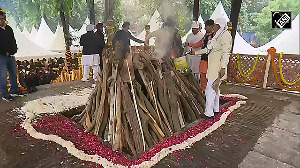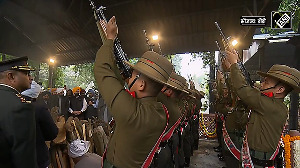Last week, two Iraqi families protested outside the UNHCR office in New Delhi because their cases for resettlement had not been submitted yet.
Nayana Bose, Associate External Relations Officer, UNHCR, tells Archana Masih that it would be incorrect to submit the Iraqis' case ahead of other refugees. The agency states that those demonstrating, like other Iraqi refugees were vulnerable, but the UNHCR processed cases according to principles of fairness, need and capacity in a non-discriminatory way.
She also spoke about the refugee status in India and the global challenges in finding a home for those displaced from their own countries.
What solutions do you have for refugees from Iraq?
People who have come from Iraq -- there is no question of going back. The same is for the Burmese. For them the solution is resettlement.
Resettlement is necessarily limited because it depends on each country. There are 16 countries that participate in UNHCR's resettlement programme. From India it is 4 or 5, not all 16. Each country has a global quota. It is not a static number, it is not a fixed quota. We keep advocating with embassies here, we keep trying.
How many refugees are there globally?
Globally there are 9.5 million refugees and 45,000 get resettled annually. So there is a huge gap between the number of refugees and resettlement. Therefore, it is something we need to prioritise and how do we do that? All refugees are vulnerable, including the ones you met outside.
From India we submitted 1,000 cases for resettlement last year of the 11,500 -- so it remains a limited option. A lot of it depends if countries increase their quota, then more people can be resettled.
What is the criteria for resettlement?
One of the criteria we use is people who have been here for a long time. There are people who have been here more than 10, 12, 15 years. For many of these long stayers, last time we were successful with New Zealand. They (New Zealand) have never taken Afghan refugees but using the criterion of protracted cases -- that they have been refugees for 20 years plus, whose children have been born as refugees and how much longer is this population going to remain refugees. These kind of advocacy arguments were made and New Zealand gave 200 slots for Afghans. The last batch left in May this year.
What is the procedure for the resettlement of refugees?
Right now we are submitting Afghans, Somalis, Palestinians for resettlement. We have a protection panel in the office which looks at the vulnerable cases across the spectrum, not per nationality. These cases are referred to another set of officers for resettlement, who try and match the case with the countries because countries have their own criteria.
Our role is to submit cases, we don't decide. If we submit a case to the US and they may well reject it then we have to submit to another embassy. Once the cases are submitted we call the refugees for another interview. Once they are accepted it almost takes a year because there are lots of formalities that need to be completed before they leave, including an exit permit.
The Iraqi family protesting outside says that 105 Palestinians who came from Iraq after them have been resettled, but the UNHCR is not hearing their case? Why is it so?
We have submitted 9 Palestinian cases.
The Iraqis outside have been refugees just for four months. They were recognised in April and May. There are procedures to be followed, given that resettlement is limited. It is not correct for us to prioritise them over people who have been waiting for much longer. Their demand is you submit our cases and want to be called in for an interview.
They say the Palestinians have been sent to various countries but not them, when they need resettlement urgently.
About the Palestinians -- they were recognised much earlier and their cases that have been submitted haven't be accepted so far. Palestinians from Iraq are a new caseload for us, they came in March 2006. We've never had this nationality before, there are around 200 people now. 153 were recognised as asylum seekers.
In our negotiations with embassies we have asked them to look at people who have been displaced from Iraq. As a test case, we have taken 9 very vulnerable families. Large families who are finding it difficult to cope, but not a single one has been accepted. Unless they get accepted there is no point in pushing others.
They (Iraqi families who were protesting) may have come to India last year but with the procedures, the interviews and so on, they were recognised as refugees only in April and May.
What is the procedure for a refugee after s/he approaches the UNHCR?
Once they approach UNHCR -- they should get an interview date with the legal officer within 6-8 months. Once they register, there and then they are told that their interview date is so and so. After the interview -- if the person is extremely vulnerable like a rape survivor etc, then we do have fast track dates.
After the interview, within a month, we commit to giving the result -- whether they are recognised or not (as refugees) in their case (protesting Iraqis) they were all recognised. In case they are not recognised, then every asylum seeker has the right to appeal within one month. The second time a different officer will review the case and there have been cases where on the second time, they have been recognised. Therefore there is no time on how long the recognition process takes.
How many refugees are there in India?
Refugees under UNHCR's mandate are 11,500. They are a mixture of Afghans, Burmese etc.
What solutions does UNHCR have for refugees?
There are three solutions for refugees worldwide -- voluntary repatriation, local integration and resettlement.
Refugee status is meant to be a temporary phase in anyone's life. It is our mandate to try and find solutions for them so that they don't forever live as refugees.
Voluntary repatriation is when the refugee chooses to go back to his own country. In many ways this is thought of as the best solution because it means someone is going back to their own country, taking the protection of their own government again.
It also means that whatever reason they left -- civil war or conflict or violence -- that has ended and peace and stability have returned. The best example is Afghanistan -- but not necessarily for India. Once the Hamid Karzai government came to power in 2002 -- some three million Afghans from neighbouring countries like Pakistan and Iran, went back.
How many Afghan refugees have returned from India?
From India we've had close to 600 Afghans who have gone back -- from 2002 till today.
Can refugees get Indian citizenship?
Local integration means naturalised citizenship but legally you still remain a refugee because you are not a national of this country and have the refugee tag. The Hindus and Sikhs from Afghanistan who came to India after the Taliban came to power are the bulk of our caseload here.
In that way it is unusual because when one thinks of Afghan refugees -- you think of Hazaras, Pasthuns etc -- the stereotypical image of the Afghan refugees but in India of the 9,200 Afghan refugees, 8,500 are Hindus and Sikhs.
These are interested in naturalised citizenship and more than a hundred have become Indian citizens and 4,000 have expressed an interest. Naturalisation is, of course, an individual process, you can't apply as a family or a group of people. Our procedure and law is that you have to wait 12 years till you apply for Indian citizenship. Most of the Afghans who came here have actually finished that residency requirement because they came in 1991-1992, when the Taliban came to power.
Naturalisation is if they want it themselves. We can't impose it upon them.
What financial help do refugees get from UNHCR?
All newly recognised refugees, including the ones outside get some financial help for the first six months. It depends on the family size. Rs 2,225 for the principal applicant and Rs 750 each for the dependents for the first six months.
After six months, the case will be reviewed because not every refugee gets this kind of an allowance. These people will get a lower allowance then because they don't have a residential permit. Because they don't have residential permit, we feel uneasy about pushing them in the informal market to work.
Thousands of refugees work in the informal market.
How many cases have you submitted recently for resettlement?
Last year we could submit 1,000 cases but in previous years it was less than 500. There is a gap between the number of refugees and the possibility of resettlement. Once the nine Palestinian cases are accepted, it will open the door for more cases. This year we want to submit more than 1,000 cases.
What solution is there for the Iraqis?
It depends on whether the Palestinian cases get accepted. Hence, we cannot give a time frame for the interview. When we get some success there, we can start calling the others displaced from Iraq for interviews, knowing that there's a chance of getting accepted. It could be a year, longer or could be less. A lot depends on the negotiations with embassies and what countries globally are doing.
There are 12,000 refugees between Syria and Lebanon. They are in terrible conditions, living in camps where temperatures are 50 degrees and winds blow their tents away. People are looking at them first.
At the local level it comes to the UNHCR India office which is advocating that these are also vulnerable people who need a solution, please consider these cases along with the Afghans and the Burmese.
At the global level as well there is a collective effort because the numbers are not just here -- there are 34 Iraqis here, remaining are Palestinians displaced from Iraq -- 200 in all.
The numbers globally are 2 million -- when the quota is 45,000 a year, where are the remaining going to go?
It is not fair to the thousands of refugees who are still looking for solutions. If we were to subvert the process by pushing the case of those who are demonstrating. We tell them we will submit your cases because we know you cannot go back to Iraq, you cannot resettle here but we cannot submit it ahead of everyone else.
What are the kinds of jobs refugees can get?
Many Burmese work in government factories, small electronic companies. Many Afghans have little shops, as salespeople because they have picked up the language. Some Afghans used to make their traditional rotis and sell them in Lajpat Nagar (an area in New Delhi).
Basically only Afghans and Burmese get a residential permit. Iranians, Iraqis, Somalis, Palestinians -- around 400 of them don't get these permits. They are welcome to go on their own but the office will not push them into the informal market.
What about refugees who may be highly qualified?
We normally don't get very highly qualified, they are exceptions. The Palestinians who have come are highly educated but with them there is a massive language problem, so we have started English-Arabic classes.
Palestinians and Iraqis have come from an urban setting, they have skills that can replicate here. We have Palestinian women who are hairdressers etc. We are also advocating with the Ministry of External Affairs for residential permits for people displaced from Iraq.
What help is provided to them about finding accommodation, schools etc?
If they cannot find accommodation within reasonable limits, YMCA has a good idea about areas where the local community is okay about having them. One of the families had a problem with the landlord and the YMCA people went and met them and our staff called them and were told that the landlord's family was coming and he was willing to extend it.
They should avail of creches, tuitions that we run. Government school forms have a section for refugees. In AIIMS there is a refugee counter that helps them because they may have a language problem. UNHCR would reimburse the cost of medicines/treatment (if any cost is incurred) for all refugees, if they go to a government hospital.
Most of the refugee kids go to school. YMCA also monitors if children are dropping out of school.






 © 2024 Rediff.com -
© 2024 Rediff.com -